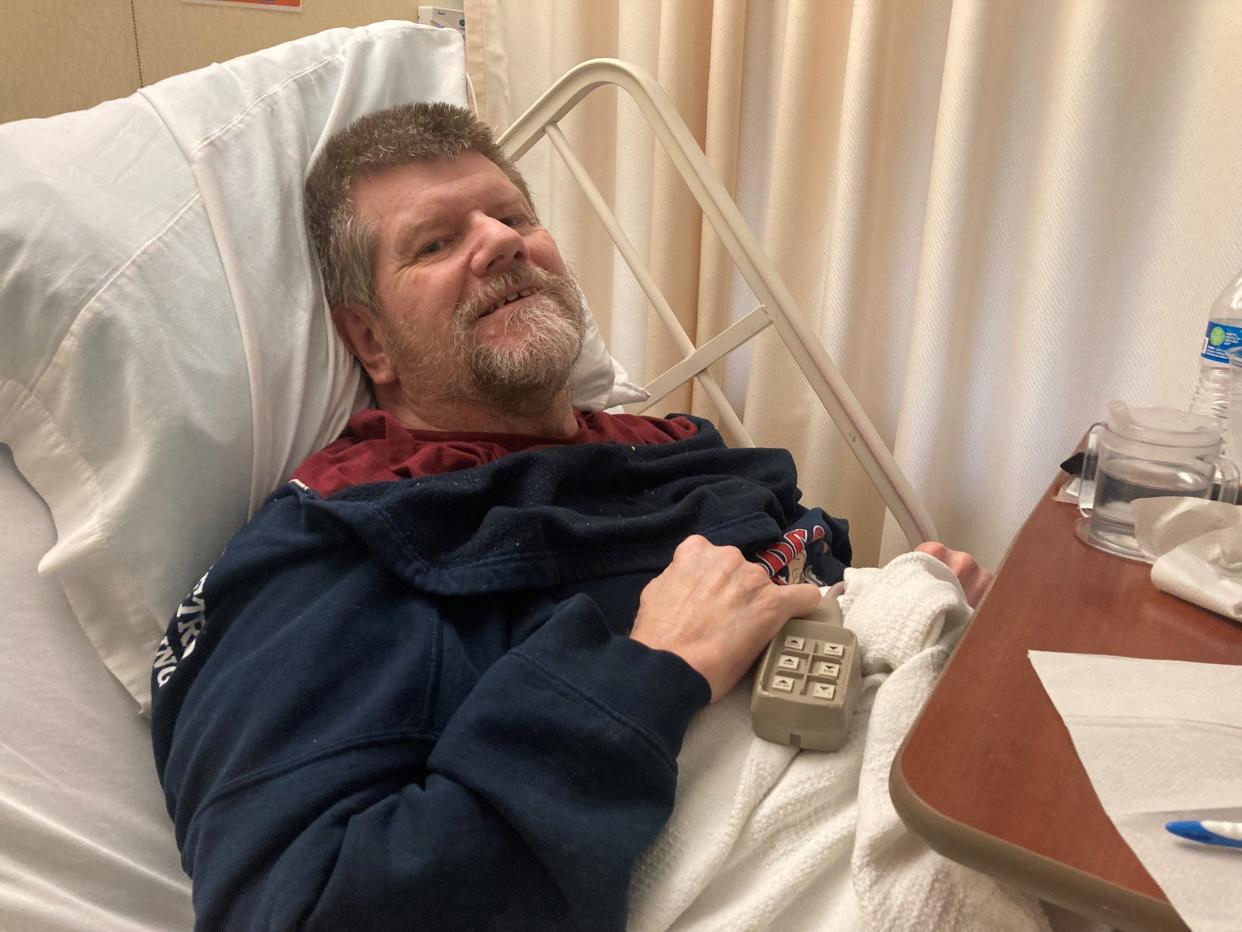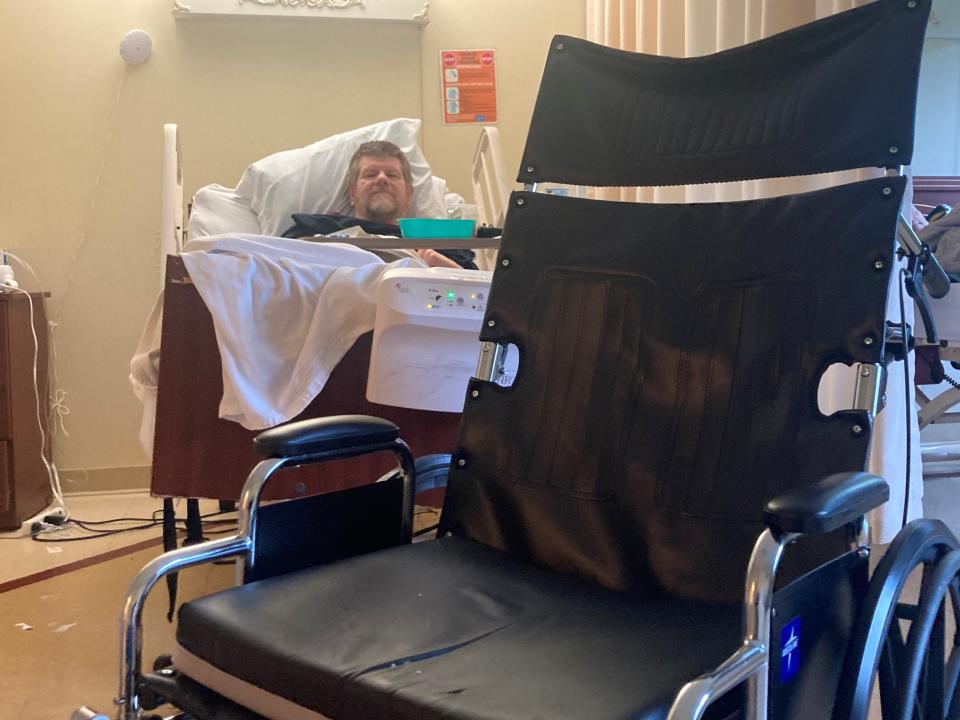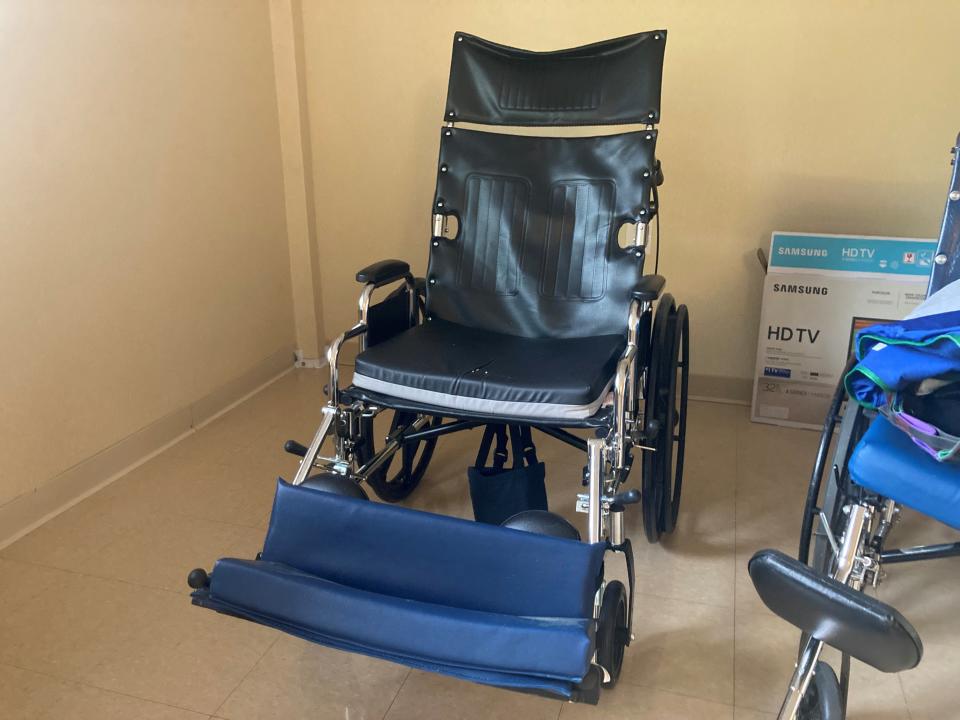'I'm stranded': NJ leaves man stuck in Manchester nursing home with no motorized wheelchair

MANCHESTER - Larry Lindstrom spent a career helping people with disabilities learn how to get around.
Now he can’t go anywhere.
The 69-year-old former instructor with Rutgers University’s NJ Travel Independence Program is paralyzed from the chest down due to a car accident three years ago.
Now he spends most of his time in bed, hoping someone will push him around, yearning for a motorized wheelchair that he can’t seem to get. He’s a resident-patient at AristaCare at Whiting, a long-term care facility in Manchester.
“I figured at some point I would be guided back into the community,” Lindstrom said. “I didn’t think it’d be stuck in a nursing home forever.”
Accessibility and transportation: Access Link riders with disabilities criticize long rides, late pick-ups
He’s stuck because although Medicaid normally would cover the cost of a motorized wheelchair for a paralyzed 69-year-old (a cost that can run from $30,000 to $60,000), he fell into a not-so-small crack in the system. If you’re in a long-term care facility, New Jersey’s labyrinthine health care laws give that facility discretion over providing a motorized wheelchair.
Often, the facilities don’t do it.
And so, the teacher is learning a harsh lesson.
“It’s a huge insurance-coverage desert,” disability advocate Jonathan Sigworth said. “Larry did everything right (throughout his career), and this is how New Jersey is repaying his work.”

'You feel hopeless'
Lindstrom grew up in Pequannock, in Morris County. He became an expert in mass transit, traveling the state to meet with disabled students and senior citizens, taking them on field trips designed to increase their comfort level with trains, buses and stations.
On May 30, 2021, he was driving on Route 280 in Essex County during a rainstorm when his car hydroplaned and flipped over. He suffered an incomplete fracture of the C-4 vertebra and spent several months at Kessler Institute for Rehabilitation in West Orange, where the staff trained him to operate a motorized wheelchair and even measured him for a custom version.
“When I told the guy my age he said, ‘Oh, Medicare will pay for it,’” Lindstrom said. “But then, nothing else happened.”
'Until it affects you': Wheelchair users still battle to make NJ more accessible
He bounced around three care facilities in Ocean County to be close to his brother, who lives in Toms River. All three offered him manual wheelchairs only.
“Once I’m in a wheelchair I can’t power it myself, so somebody has to push me, but that somebody half the time is doing something with somebody else, so I wind up sitting here waiting and most of the time there’s nobody to push me — I’m just sitting in the chair,” he said. “Even if they do push me and I go outside, at some point I’ve got to come inside. I might tell them, ‘Come back in half an hour,’ but they’ll forget and then I’m stranded out there. That’s my situation.”
Lindstrom said he likes the facility and the staff at AristaCare at Whiting, but such dependence has rendered him unable to move past the accident.
“The accident changed so much: In one minute I lost my car, lost my apartment, lost my job, everything,” he said. “Even three years later I’m mourning all that. Probably the reason is I’m laying in bed half the time. If I were active and moving forward, I could create a life.”
Instead even his simplest pleasure — a cup of coffee from the Starbucks kiosk at the facility — requires someone’s assistance.
“In three years I haven’t been to a restaurant, a shopping center, a park,” Lindstrom said. “If you’re not doing anything, you get depressed. You feel hopeless.”
Transportation help: Monmouth County offers free rides for medical visits for anyone who needs one

A widespread problem
From his home in Connecticut, Sigworth is monitoring the situation with dismay. He’s president of More Than Walking, a nonprofit that promotes independent living after a spinal cord injury. Though he uses a manual wheelchair, Sigworth has served as a mentor to peers with motorized chairs, and he’s acutely aware of the bureaucratic hurdles.
“This is happening to patients nationwide,” Sigworth said.
In states with laws like New Jersey’s, he explained, the justification is that nursing homes “do not have to provide you with a wheelchair for you to live independently because they are providing you with the 24/7 care, so they can get you to where you need to be within the facility,” Sigworth said.
But that hampers someone like Lindstrom, who is sharp and capable of living in an accessible apartment with some in-home caregiving.
How you helped: Generous APP reader, business give paralyzed Neptune mom a way out of the house
“Not having access to a personal mobility device also means he doesn’t have access to the one piece of equipment that would give him the ability to move out,” Sigworth said. “So he’s stuck in limbo.”
A legislative fix is needed — the kind that took place decades ago in Connecticut.
“In Connecticut it doesn’t matter if you’re in a nursing home,” Sigworth said. “Medicaid is paying for the (motorized) wheelchair so they provide the wheelchair — it’s straightforward.”
Instead Lindstrom is at the mercy of his facility. When contacted by the Asbury Park Press about Lindstrom’s situation, AristaCare Health Services CEO Sidney Greenberger replied, "When our rehabilitation team identifies a resident who might benefit from a customized wheelchair, we initiate a collaboration with a specialized wheelchair provider. This partnership begins with our recommendation, based on thorough assessment, and transitions into the hands of the wheelchair company. They undertake a detailed evaluation to determine medical necessity and start the process of obtaining necessary approvals from the patient’s insurance provider."
In Lindstrom's case, Greenberger said, "We've already forwarded our recommendation to the wheelchair provider and are continuously supplying them with the necessary documentation to support their application for insurance approval. We’ve been informed that the insurance company is still reviewing the request and asking for further documentation, which we are providing promptly."
In the meantime, Lindstrom hangs onto his goal of moving to a Jersey Shore town with good public transportation and using a motorized wheelchair to live a fulfilling life. All that advice he dispensed over the years? Time to put it to use.
“There’s a lot of irony there,” he said. “Now I’m the one who needs it — but I don’t have the wheelchair yet."
Jerry Carino is community columnist for the Asbury Park Press, focusing on the Jersey Shore’s interesting people, inspiring stories and pressing issues. Contact him at jcarino@gannettnj.com.
This article originally appeared on Asbury Park Press: Man trapped in Manchester nursing home without motorized wheelchair

